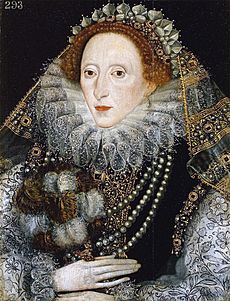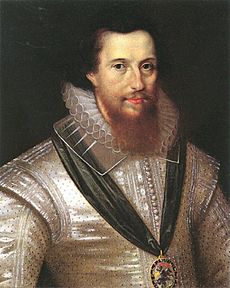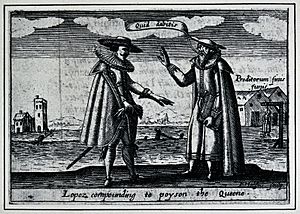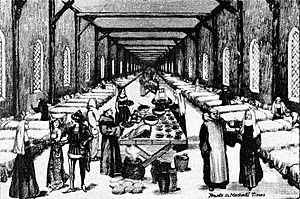Roderigo Lopes facts for kids
Roderigo Lopes was a famous doctor who served Queen Elizabeth I of England. He was her main physician from 1581 until he was executed in 1594. He was found guilty of planning to poison the Queen. Lopes came from a Jewish family in Portugal who had become Christian. He is the only royal doctor in English history to have been executed. Some people believe he might have inspired the character of Shylock in Shakespeare's play The Merchant of Venice, which was written a few years after Lopes's death.
Roderigo Lopes was born in Portugal. His father was also a doctor for the Portuguese king. Lopes was raised as a Catholic and studied at the University of Coimbra. During a time called the Portuguese Inquisition, he was accused of secretly practicing Judaism. Because of this, he had to leave Portugal. He moved to London in 1559 and became a member of the Church of England. He started working as a doctor at St Bartholomew's Hospital. Lopes became known as a very careful and skilled doctor. He gained many important patients, including powerful people like the Earl of Leicester and Sir Francis Walsingham. Eventually, he became the Queen's own doctor.
In January 1594, the Earl of Essex accused Lopes of planning to poison the Queen. Lopes said he was innocent. However, he was found guilty of high treason in February. He was executed in June. It is said that at his execution, he declared he loved the Queen as much as he loved Jesus Christ. Because he came from a Jewish background, this statement made the crowd laugh. Queen Elizabeth waited three months before signing his execution order. Some people think this means she had doubts about his guilt. After his death, she returned almost all of his money and property to his wife and children.
Contents
Early Life and Becoming a Doctor
Roderigo Lopes was born in Crato, Portugal, around 1517. His family had Jewish roots. His father, António Lopes, was a doctor for King John III of Portugal. António had been forced to become a Roman Catholic in 1497. Roderigo was also baptized and raised as a Catholic. He was known as a "New Christian" or converso, meaning his family had recently converted from Judaism to Christianity. He went to the University of Coimbra for his education. He earned his first degree in 1540 and a master's degree in 1541. He likely became a doctor in 1544.
During the Portuguese Inquisition, Lopes was accused of being a "Crypto-Jew." This meant he was suspected of secretly practicing Judaism while pretending to be Christian. Because of these accusations, he had to leave Portugal. He moved to England in 1559. In England, he changed his first name to "Roger" and continued his work as a doctor in London. He joined the Church of England. Soon, he became the main doctor at St Bartholomew's Hospital in Smithfield. A fellow doctor, William Clowes, said in 1591 that Lopes was "careful and very skilful."
Around 1563, Lopes married Sarah Anes. She was also from a "New Christian" family who had fled the Portuguese Inquisition. Some historians believe that both the Lopes and Anes families secretly practiced Judaism, even though it was against the law in England at that time. However, Lopes always said he was a Christian. Roderigo and Sarah had four sons and two daughters. At least five of their children were baptized at St Bartholomew-the-Less church. Lopes's brother, Lewis, lived with them. Another brother, Diego Lopes Aleman, became a merchant in other European cities.
Serving Queen Elizabeth I

Lopes became a very popular doctor among powerful people. His patients included Robert Dudley, Earl of Leicester, and Sir Francis Walsingham, who was a main secretary to the Queen. In 1581, Lopes was made the chief doctor for Queen Elizabeth I and her household. He received a yearly payment of £50 for this job. In 1584, the Queen gave him a special right to be the only person allowed to bring certain spices, like aniseed and sumac, into England for ten years. This right was renewed in 1593. In 1588, he was also given land and payments from the church in Worcestershire.
At that time, some people in England believed there was a plot by Catholics and Jewish doctors to poison patients. In Portugal and Spain, doctors from Jewish backgrounds were often accused of harming their patients. In 1584, a Catholic pamphlet accused "Lopes the Jewe" of being involved in poisoning plots.
Lopes spoke five languages, which was very useful for diplomacy. Many Christians of Jewish background were involved in international affairs during this period. During England's war with Spain in the 1580s, Lopes became an important person among Portuguese exiles in England. He also acted as the Queen's go-between with a Portuguese prince named Dom António, who was trying to claim the Portuguese throne. Lopes supported Dom António. However, in 1586, one of Dom António's companions suggested to the Spanish Ambassador that Lopes could be persuaded to poison Dom António. Spain did not act on this idea.
In 1590, Lopes contacted a Spanish official, possibly to start peace talks. The Spanish gave Lopes's messenger a valuable ring as a gift for Lopes's daughter. After Sir Francis Walsingham died in 1591, Lopes continued to exchange letters with Spanish officials. He did this without the English government knowing. There is no clear proof that Lopes planned anything against England or the Queen. However, these secret connections with Spain would later cause him serious trouble.
Trial and Execution
By the early 1590s, Lopes was a wealthy and respected man. He owned a nice house in Holborn. His youngest son was studying at Winchester College. The Earl of Essex began to gather information against Lopes. Essex believed Lopes was secretly working for King Philip II of Spain. At first, the Queen and Lord Burghley thought Essex's accusations were silly.

In late 1593, Essex found secret letters between one of Dom António's former supporters and Spanish officials. Essex had a messenger arrested. Lopes's own messenger was also arrested. Both of them mentioned Lopes during questioning. On January 28, 1594, Essex wrote that there was a "dangerous treason" against Queen Elizabeth. He claimed that "Dr Lopus" was supposed to carry out the poisoning. Lopes was arrested and held at Essex House, then moved to the Tower of London. He confessed when he was threatened with torture, but he quickly took back his statement.
It was also revealed that Lopes had secretly exchanged letters with Spanish officials. He had given them information about the English court. He had also supposedly given money to a secret Jewish meeting place in Antwerp. These revelations made Lord Burghley and another official, William Wade, believe the worst about Lopes. Lopes and the two messengers were put on trial in London on February 28, 1594. Lopes insisted he was innocent. The prosecutor, Sir Edward Coke, called Lopes a "Jewish doctor worse than Judas himself." All three men were found guilty of high treason and sentenced to death.
The Queen waited over three months before signing the order for his execution. Some people think this delay means she had doubts about whether he was truly guilty. Lopes and the two messengers were executed at Tyburn on June 7, 1594. Lopes maintained until the very end that he was innocent and that his Christian faith was real. At the execution, he reportedly said that "he loved the Queen as well as he loved Jesus Christ." The crowd laughed loudly, thinking this statement from a man of Jewish background was a hidden confession.
Lopes's property was taken by the government after his conviction. His wife, Sarah, asked the Queen to let her keep his estate. The Queen kept the ring that the Spanish had given to Lopes's daughter, but she returned the rest of his property to his family. Elizabeth also gave £30 a year to his son Anthony to help him with his schooling. Years later, a Spanish diplomat wrote that Lopes had been wrongly convicted. He said that the King of Spain had never planned such actions, and that Dr. Lopes was a friend of the Queen. Roderigo Lopes is still the only royal doctor in English history to have been executed.
Possible Influence on Literature
Some historians and literature experts believe that Roderigo Lopes and his trial influenced William Shakespeare's play The Merchant of Venice. This play was written around 1596–1598. They think Lopes might have been a model for the play's main character, Shylock. Shylock is a Jewish moneylender in Venice who dislikes Christians. The Lopes case also led to a new interest in Christopher Marlowe's play The Jew of Malta, which was written around 1589–1590. Rehearsals for this play reportedly began in London on the same day Lopes was taken to Essex House. In Marlowe's play Doctor Faustus, there is a line that mentions Lopes, saying: "Doctor Lopus was never such a doctor!" This line was likely added after Marlowe's death in 1593.
 | Stephanie Wilson |
 | Charles Bolden |
 | Ronald McNair |
 | Frederick D. Gregory |



